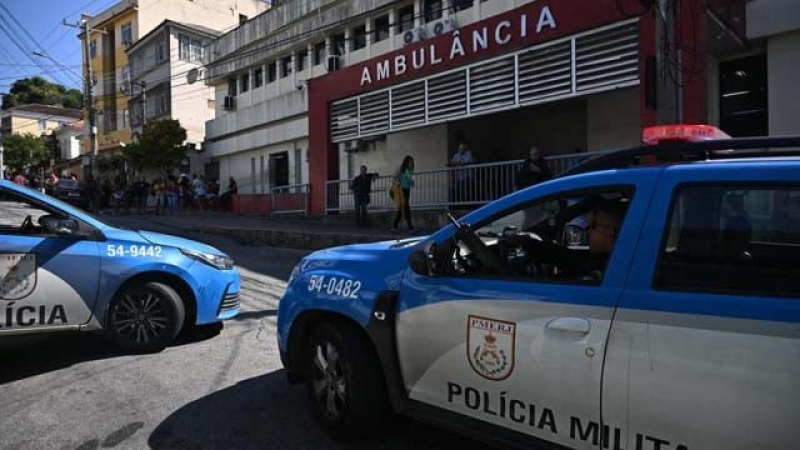- Tk 500cr Drive to Turn Haor Fallow Land Into Farmland |
- Tarique Rahman returns home amid rapturous reception |
- Home After 17 Years: Tarique Returns to Gulshan Residence |
- Tarique Calls for United Effort to Build a Safe Bangladesh |
- Tarique leaves for 300 feet area from airport |
Sao Paulo police accused of abuses in operation that has killed 47

Leonel Andrade was chatting with a friend on a street in their neighborhood of Sao Paulo, Brazil, when they came under police gunfire, recounts his wife Beatriz da Silva.
The 36-year-old father of three was killed: one of 47 civilians to have fallen so far in an ongoing police operation dubbed a "massacre" by NGOs.
"They said there was a shootout but it's a lie!" Da Silva, 29, told AFP of her husband's death in a favela of Baixada Santista, on the coast of Sao Paulo state, saying he was unarmed.
Thousands of officers have been deployed as part of "Operation Summer" since December 18 against drug trafficking in the region. The area is a hub of organized crime because it houses the port of Santos, Latin America's biggest, through which an untold amount of contraband is moved, reports BSS.
The operation has resulted in 47 "suspects" being killed in "clashes" with the police, the Sao Paulo security department told AFP. A total of 921 "criminals" have been arrested.
But NGOs accuse the police of "summary executions" and the "torture" of civilians, and earlier this month approached the UN Human Rights Council in Geneva to call for the operation to be halted.
The council had previously spoken out against police violence and alleged extrajudicial executions in the country, as it reported an increase last year in the number of Brazilians of African descent to die at the hands of police.
According to a report from the Sao Paulo public defender's office, which provides free legal aid to people in need, Operation Summer has resulted in the "largest massacre" in Brazil since 1992, when more than 100 prisoners died in another police operation.
Da Silva said Andrade had served time in prison for drug trafficking but had since left "all that" behind.
She was the one to find him dying on the street.
"The cops wouldn't let me help him and they didn't try to do anything," she said.
- 'I don't care' -
Sao Paulo Governor Tarcisio de Freitas, an ally of far-right former president Jair Bolsonaro, has defended the operation.
"We are at peace with what is being done. They can go to the UN, to the Justice League, wherever they want. I don't care," he recently told a public event.
Freitas, whose name has been mentioned more than once as a possible presidential candidate, has stepped up the fight against organized crime since the murder of a police officer in Sao Paulo in mid-2023.
This week, he told journalists that merchants and residents of Baixada Santista -- populated mainly by poor and Black people -- are calling him to thank him for "restoring order."
The operation would continue for "an indeterminate time," added the state's security secretariat head, Guilherme Derrite.
"In all cases, the weapons used by the criminals to threaten the lives of police were seized," he told AFP.
Claudio da Silva, an ombudsman tasked with keeping an eye on police actions in Sao Paulo, said participants in Operation Summer and similar deployments functioned on the principle of claiming "an eye for an eye and a tooth for a tooth."
Human Rights Watch's Brazil director Cesar Munoz has accused Freitas of giving the police "carte blanche to do whatever they want" in Baixada Santista's vulnerable neighborhoods.
Munoz said HRW had several reports of cases in which crime scenes are not properly secured or scoured for clues, making it possible to cover up evidence of wrongdoing. And witnesses are afraid to speak out for fear of reprisals.
According to Brazil's Mothers in Prison Movement, which also seeks to provide help to victims of violence, the police act as if they were an "extermination group."
"People don't deserve to die just because they live in the favela or have a criminal record," said the group's leader, Mae Andreia, who uses a pseudonym for fear of her own safety.

